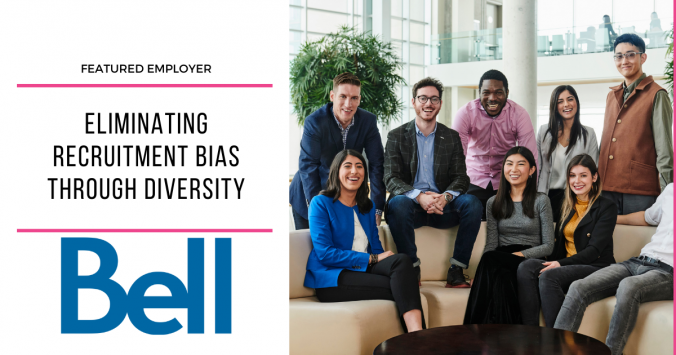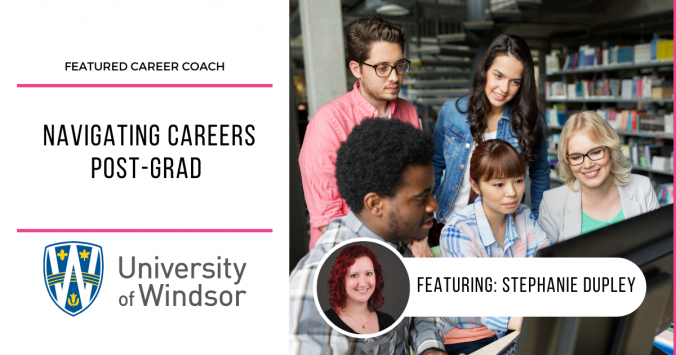Bell is packed full of superstar recruiters who find and hire hundreds of high potential students every year, including Minami Alguire, Senior Manager for Talent Acquisition. TalentEgg had the chance to hear how the Bell recruitment team is passionate about welcoming students, helping students find their fit, eliminating bias and seeing students’ potential to contribute meaningfully straight out of school. Finding one’s path after school can be daunting, and it makes Bell proud to know how the company’s recruiters show up for students. Recruiters make connections and share their expertise with students at recruitment events and work with hiring leaders to make matches between students and teams that are great for business and key post-graduation milestones for the student hires.
Bell is a space where recruitment and development merge. The company recognizes that there is so much opportunity for student hiring to bring fresh ideas and skills into the organization and invest in future generations. With solid support from its executive team, Bell has the passion and the commitment to make great things happen in the campus recruitment space!
Please keep reading to learn more about how Bell welcomes new grads and students and what opportunities are available after joining the company. As well as Bell’s commitment to mental health & what steps are being taken to create an inclusive workplace.
Bell’s Main Initiative for Students and New Graduates
Bell welcomes students and new graduates into the telecommunications, media, and retail industries via the company’s award-winning internship and recent graduate leadership programs. Bell knows precisely how important the transition from school to work is and has over ten years of experience successfully launching new grads into leadership positions.
Commitment to Mental Health in the Workplace
Bell Let’s Talk partners with schools across Canada to equip post-secondary schools with digital tool kits to engage students in conversation around awareness and self-care. Last year, Bell announced the launch of the $3.1M Bell Let’s Talk Post-Secondary Fund to support Canadian colleges and universities in implementing the National Standard of Canada for Mental Health and Well-Being for Post-Secondary Students.
One of the four pillars of the Bell Let’s Talk campaign is workplace leadership, and Bell is proudly committed to leading by example in this space. Since 2010, more than 18,000 Bell employees and 13,000 Bell leaders have completed mental health training. Bell’s initiatives to improve mental health awareness, training and benefits have reduced short-term disability claims related to mental health by over 20% and reduced relapse and recurrence by more than 50%. Earlier this year, Bell has enhanced its psychological care benefit to provide unlimited coverage for mental-health services!
Essential Aspects of the Career Path
Bell is a leader in taking care of its employees, and it shows through the mentorship and experience provided.
- Executive Mentorship – Bell helps students and recent grads gain exposure to exceptional leaders throughout the company. Minami’s executive mentor was paired with her during her time in the graduate leadership program, and they still meet regularly!
- Real experience – Whether a student joins Bell for the summer or a full-time role after graduating, they can expect to work on real projects that impact how Canadians communicate with each other and the world.
- A sense of community – Bell’s cohorts have many opportunities to bond during onboarding and stay connected as they move through their careers. For new hires, this means joining a company with a built-in network of over 1500 alumni that finished the program before them!
Diversity, Equity & Inclusion Initiatives
For Bell, diversity, equity and inclusion are more than a seat at the table; it’s the key to the skills and innovation that make the whole more significant than the sum of its parts. Everyone benefits from a diverse, equitable, and inclusive environment! Sometimes DE&I shows up at work in meaningful ways – like Bell’s 2020 announcement to hire a minimum of 40% BIPOC talent in its new grad and intern programs – sometimes it shows up in the little things, like colleagues eagerly learning how to pronounce someone’s name. At Bell, they don’t just accept difference – they celebrate it!
#TeamBell is also passionately committed to DE&I. Bell currently has three employee resource groups run entirely by employees to support its members and allies. These include Women at Bell, Pride at Bell, and Black Professionals at Bell.
Taking Steps to Eliminate Bias in the Hiring Process
Bell has several steps to reduce and eliminate bias in its hiring process. These include conscious inclusion training to help employees and leaders better understand unconscious bias and their critical role in fostering an inclusive workplace. Bell also ensures hiring decisions are made with various thoughts and inputs to guarantee that Bell continues to be one of the best companies to work for in Canada.
The best way to help students and new graduates get involved with Bell opportunities is for them to speak to recruiters directly! Bell publishes its events calendar on its career site and its TalentEgg page throughout the year. The company’s virtual career fair is one of the highlights of the recruitment calendar. Students will meet some current grads, hiring leaders, and recruiters, hear from executives, participate in speed interviews, and access exclusive webinars and resources from the recruitment team. In the meantime, you can read more about Bell HERE!


